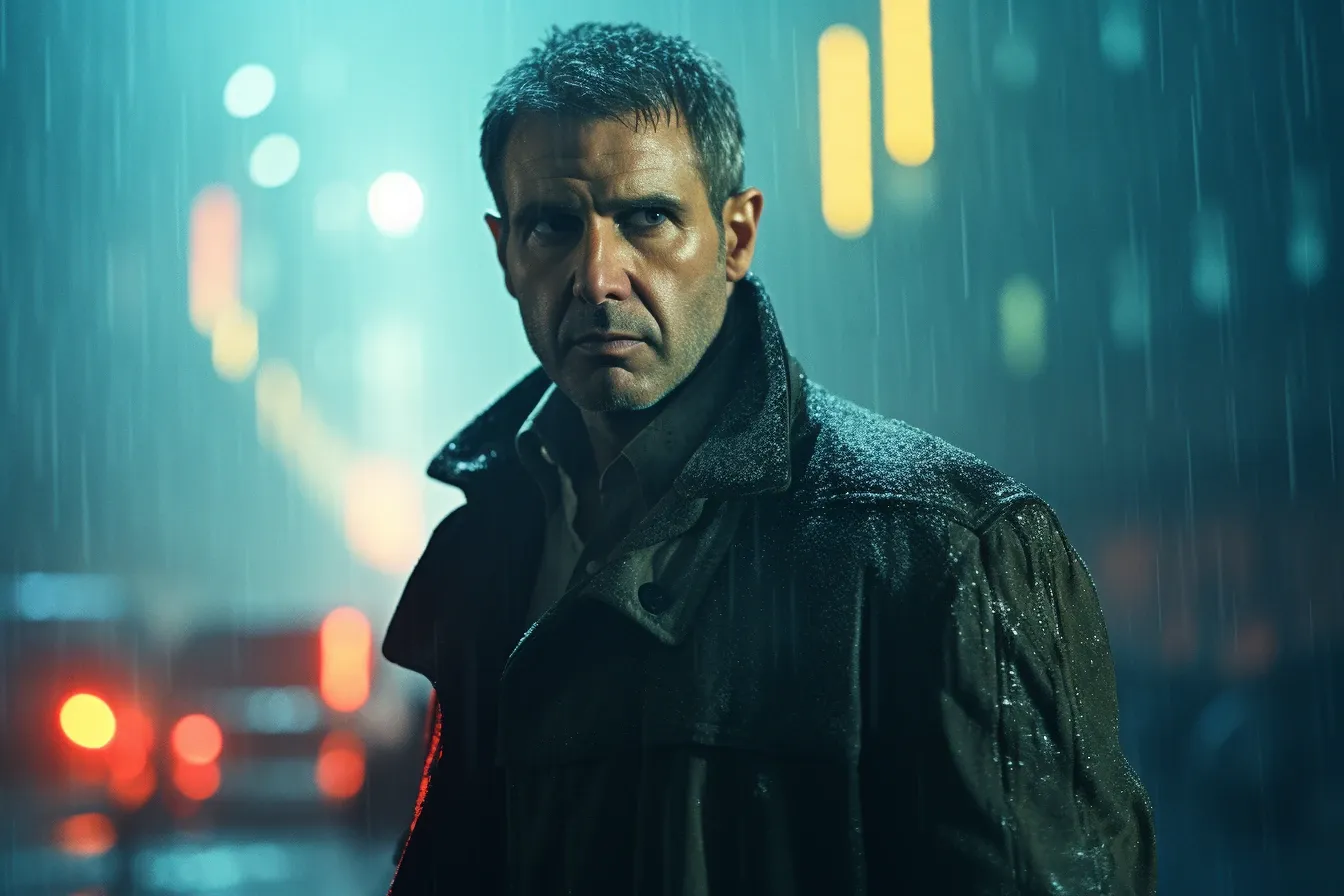Do Androids Dream of Electric Sheep?
The imminent biological disintegration as a result of the radioactive catastrophe, the need for a 'belief', even if it is illusory (TV cult), the dumbing down of consciousness and ability to choose caused by the mass media.

Rick said calmly, "I don't want an animal to keep in the house. I want what I had, a big animal. A sheep or, if I put the money together, a cow, an ox or one like yours, a horse." He realized that the reward for eliminating five droids would be enough.
Dick's postmodern sci-fi
Dick, Philip Kindred (Chicago 1928 - Fullerton, California 1982), was a prolific and controversial writer with a chaotic and tumultuous life. Drugs and hallucinogens were no strangers to him. Although he was often portrayed by the critics of his day as a prolific writer of sloppy paperbacks, Dick created an intensely personal cosmology in which the open wounds of the seemingly normal, everyday reality were seen with a pessimistic clarity. P.K. Dick does not belong to a defined genre, although he is related to science fiction. In his novels, science fiction is hybridized with pure fantasy, gothic, and detective stories, mixing in what critics call 'postmodern' writing.
Dick's deep theme
Even if one continues to see Dick as caught in the webs of science fiction dedicated to the idea of a futuristic utopia, it is clear that his stories contain a reflection on the American reality of his time. His mission as a writer was to criticize American mass society. The threat (or effects) of nuclear war, the nefarious consequences of capitalism and the logic of the market, and the influence of the entertainment media, with television as public enemy number one, are themes that recur frequently in his work. But the theme that most pervades Dick's work has another source, more deeply rooted in consciousness: the obsession with a reality hidden within the ego, the confusion between dreaming and waking, the inability to distinguish the real from the replicated, as in the mechanical replicas indistinguishable from the originals in 'Do Androids Dream Of Electric Sheep?'.

Do Androids Dream Of Electric Sheep?
Dick, Philip Kindred masterpiece, controversial, complex novel, known to the general public thanks to the cult film that made it famous: Blade Runner [Ridley Scott 1982]. In 'But Do Androids Dream of Electric Sheep?' several themes intertwine. The imminent biological disintegration as a result of the radioactive catastrophe (we are only a short time away from the bombs on Japan), the need for a 'belief', even if it is illusory (TV cult), humanity and the fine line with its imitations, identity and its doubts, the dumbing down of consciousness and ability to choose caused by the mass media, which paralyzes cognitive abilities. But also the flatness of life and the daily discomfort of Iran, marginalization like Isidore's, and inevitably racism.
The plot
The story takes place in a future after the atomic bomb, when the earth is contaminated by the fallout, which has wiped out almost all animals, made a number of humans sterile and stupid, and forced all those who wish to start a new life to emigrate to other planets. On the planets they have colonized, humans use androids, artificial organisms completely indistinguishable from humans, for heavy labor, the only difference being that they do not age, but have a life cycle of only a few years. However, some of them, tired of being slaves, escape from the colonies and try to find a way to hide on Earth. The police search for them and authorize bounty hunters to "pick up" the androids, i.e. to kill them. The protagonist, Rick Deckart, is one of them.

Title meaning
The title mentions electric sheep because in Philip Dick's devastated world, real animals are very rare and only artificial ones can be had. Electric ones, that is. And Rick, who dreams of having a real animal, has only ever had an electric sheep. When he collects the bounty from the first android he kills, he buys a real one. But it will be the very android he has fallen in love with who will kill it for him to avenge his comrades. Humans and androids must therefore resign themselves to dreaming only of electric sheep.
Blade Runner or Electric Sheep?
The editions that followed the release of Scott's film did not carry the original title, but adopted that of the movie "Blade Runner," a publishing strategy designed to boost sales of a very difficult novel by taking advantage of the bandwagon effect guaranteed by the Hollywood production.
However, Dick makes many references to the real world in his novel. One example is Al Jarry, Mercer's real identity, clearly inspired by the Dadaist writer Alfred Jarry; Frank Merrywell, hero of a series of children's books from the early 20th century; also mentioned are Edvard Munch's The Scream and Puberty, and so on. But there are also internal references to other works by Dick himself: Isidore, already mentioned in Confession of a Crap Artist, Wilbur Mercer's religion, already mentioned in The Little Black Box. As we read Dick's books, we pick up bits and pieces of his world, which we might put together into a mosaic, into a fantastic whole that could be considered one world, but seen from different points of view.
Rick and John
The main characters who are in competition for the point of view are Rick Deckard and John Isidore. They are interesting cases. They are on the borderline between humanity and other. They have biological characteristics that suggest humans, but the former is affected by a lack of emotion, and the latter is gradually unraveling on the psychic level and is considered to be on a lower rung than the Nexus-6 type of androids, although Isidore is biologically 100 percent human.
Rick is suspended between nature and society, he is an unstable man who does not have many expectations in life, except to improve his social status, or rather his image, with a real animal. He is not interested in acquiring higher levels of empathy, as Mercerianism dictates, but simply in exhibiting an expensive animal on the terrace of his own home. The story that unfolds around him has a threefold aspect. The most obvious is the battle, the physical confrontation with the androids, a battle that will have a positive outcome for him.
Isidore and the Condapp
Isidore is a differently abled individual, or rather special. He has lower than average psychic abilities, but all in all he is the best representative specimen of humanity. He takes us into his Condapp to get to know the other characters, the androids, who can be better understood and deepened in this way, in order to better represent the narrative project of comparing humans and replicants. His co-starring role dissolves with Deckard's arrival. We know nothing about Isidore after the death of the Replicants, but we continue to follow Rick. We leave Isidore crying on the stairs of his house.
Conclusions
Dick's is a difficult novel, with interlocking points of view telling fragments of real or artificial humanity. Technology has come to produce artificial memories, for androids as well as humans, and this means that no one is really sure of being themselves. This leads to a perpetual instability in the relationships between individuals, natural or artificial, because everyone can be what they are not formally, and deceive themselves into being something other than what they should be. Central and ultimate theme in thinking about the development of technology. What would happen if people no longer had the certainty of being themselves, and their selves could be conditioned, constructed in a laboratory, invented? The manipulation of human beings would run the risk of destroying humanity's sense of self. A destruction more horrible and final than an atomic bomb.
Bibliography
- Philip K. Dick. Do Androids Dream of Electric Sheep? (Blade Runner Edition). New York: Ballantine Books, 2007.
- Judith Kerman, ed. Retrofitting Blade Runner: Issues in Ridley Scott's Blade Runner and Philip K. Dick's Do Androids Dream of Electric Sheep?. Madison, WI: Popular Press, 1997.
- Barlow, Aaron. How Much Does Chaos Scare You?: Politics, Religion, and Philosophy in the Fiction of Philip K. Dick, Lulu.com, 2005.
- Dick, Anne R. Search for Philip K. Dick, 1928-1982: A Memoir and Biography of the Science Fiction Writer, Lewiston NY: Edwin Mellen Press, 2005.
- Fabio Ivan di Bari. Do Androides Dream of electric sheep? A narratological analysis. Annales Neophilologiarum nr 4, 27-39, 2010.
